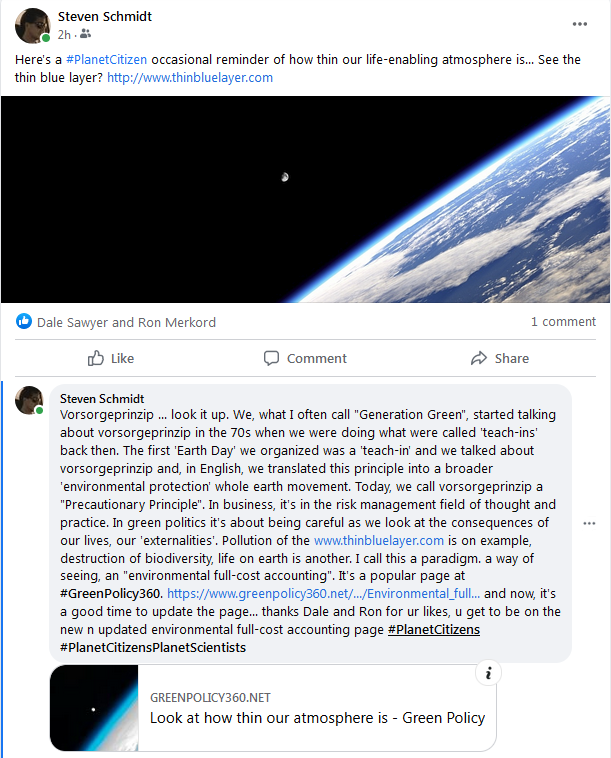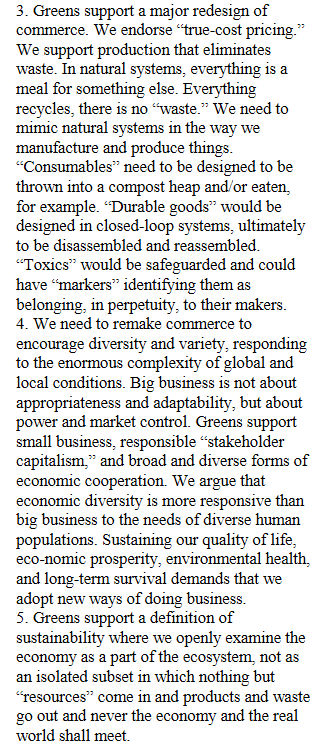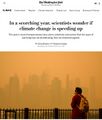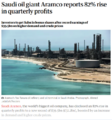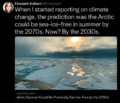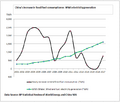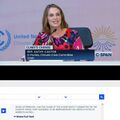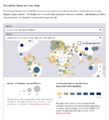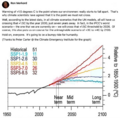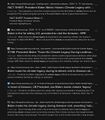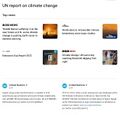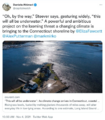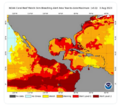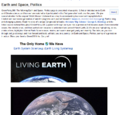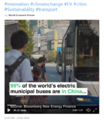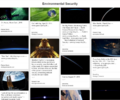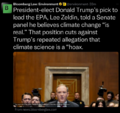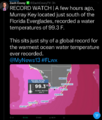Category:Environmental Full-cost Accounting
Steven Schmidt:
Vorsorgeprinzip ... look it up. We, what I often call "Generation Green", started talking about vorsorgeprinzip in the 70s when we were doing what were called 'teach-ins' back then. The first 'Earth Day' we organized was a 'teach-in' and we talked about vorsorgeprinzip and, in English, we translated this principle into a broader 'environmental protection' whole earth movement. Today, we call vorsorgeprinzip a "Precautionary Principle". In business, it's about being careful as we look at the consequences of our lives, our 'externalities'. Pollution of ThinBlueLayer is one example, destruction of biodiversity, life on earth is another. I call this a paradigm, a way of seeing, an "environmental full-cost accounting".
- http://www.planetcitizen.org
- http://www.planetcitizens.org
- https://www.greenpolicy360.net/w/Planet_Citizens,_Planet_Scientists
- http://www.thinbluelayer.com - https://www.greenpolicy360.net/w/Category:ThinBlueLayer
- * https://www.greenpolicy360.net/w/Category:Whole_Earth
- https://greenpolicy360.net/w/Earth_Day - https://www.greenpolicy360.net/w/Category:Earth_Day
- https://www.greenpolicy360.net/w/Environmental_protection - https://greenpolicy360.net/w/Category:Environmental_Protection
- https://www.greenpolicy360.net/w/Category:Environmental_Full-cost_Accounting
- https://www.greenpolicy360.net/w/Category:Externalities
- https://de.wikipedia.org/wiki/Vorsorgeprinzip
- https://www.eea.europa.eu/publications/environmental_issue_report_2001_22
- https://www.eea.europa.eu/publications/environmental_issue_report_2001_22/issue-22-part-17.pdf/view
- https://en.wikipedia.org/wiki/Precautionary_principle
○ ○ ○ ○ ○ ○ ○ ○ ○ ○
Triple-bottom line
http://www.greenpolicy360.net/w/Triple_Bottom_Line
○ ○ ○ ○ ○ ○ ○ ○ ○ ○
Full Price of the Carbon Economy
The growing impact of climate change is exposing a fallacy at the heart of the hydrocarbon economy: Big Oil cannot simply exempt itself from the natural economy governing all things in the closed system called planet Earth...
○
The Cost of Externalities Is Rising, the Future Day of Reckoning Is Here Now
An externality is, according to Investopedia, a "consequence of an economic activity that is experienced by unrelated third parties." And externalities can be either positive or negative. It's easy to identify the positive externalities of the hydrocarbon economy. Oil has powered a higher standard of living for millions of people in the global North. Petrochemicals have generated such an agricultural bounty that the United States alone discards up to 40 percent of the food it produces annually without risking famine - yet. And cheap plastic manufacturing allows even many of the poorest members of rich economies unprecedented access to low-cost consumer goods.
On the other hand, the hydrocarbon economy has negatively externalized the impact of its business model by emitting greenhouse gases - carbon dioxide, methane, nitrous oxide and fluorinated gases - without ever paying for the actual cost of those emissions insofar as they impact the ecosystems upon which their businesses and, increasingly, the lives of their customers depend...
The "Mother of Market Corrections" Is Coming Home with a Message
In 2008, the environmental thinker Lester Brown wrote about the inherent blindness of the invisible hand.
Brown lamented the "fundamental weaknesses" preventing it from incorporating "the indirect costs of producing goods" into market prices and bemoaned the fact that it doesn't "value nature's services properly." In the short term, Brown was right. But he underestimated the power of an even larger "economy" at work in the self-correcting system called "planet Earth."
In less than a decade, Mother Nature's ever more visible hand emerged as a force punishing the "market inefficiencies" and rampant externalization of the hydrocarbon economy. The best indicator of this correction is the mounting loss of "ecosystem services." These are the common goods upon which human civilization - and, truth be told, all life - depends. Yet, humans simply take them for granted.
It's the clean, clear water, life-sustaining oxygen and life-giving soil.
It's the carbon-capturing forests and carbon-retaining power of the oceans.
It's the 1/32 of the planet that is arable land.
Mother Nature is tabulating costs with each passing year as the impact of climate change compounds like bad interest.
Perhaps most pressing, it's the crucial permafrost "carbon banks" found in the earth's heretofore frozen regions. Permafrost matters because its long-frozen layers safely store greenhouse gases that slowly accumulated over the course of thousands of years. New research estimates a potential $43 trillion global economic impact should those "hundreds of billions" of tons of carbon dioxide and "billions of tons" of methane be released into the atmosphere by the rapidly warming Arctic. As Pacific Standard points out, that bill "isn't a total cost to be spread out over several decades - it's how much we'd have to set aside today to pay for the damage done by melting frozen soil, or permafrost, in the Arctic." And yet more new research shows that Arctic regions are warming twice as fast as the world average because the solar-reflecting properties of the ice and snow are diminishing with each passing year...
Also diminishing each year are the unparalleled "ecosystem services" of the oceans, forests and other food webs that sustain earth's interwoven fabric of life. Based on calculations by scientists at the United Nations University, the world forfeits a "staggering $6.3 trillion to $10.6 trillion" each year just from land degradation. That's roughly "10-17% of global GDP." What are the services lost? Properly cared for land provides "food, poverty reduction, clean water, climate and disease regulation and nutrients cycling."
Hydrocarbon-obsessed humans have long ignored these opportunity costs, but Mother Nature factors it all into her bottom line. And we are running a massive budget deficit. That's why tabulating "environmental services" is crucial to understanding the environmental deficit at the core of the hydrocarbon economy - and it's crucial if human beings want to avoid the ultimate bankruptcy of extinction.
More greenhouse gases equal more warming, equals more carbon released from permafrost, equals less carbon captured by soils, plus oceans equals more warming. On it goes until nature, like theoretically free markets, eventually enforces equilibrium.
This mother of all market corrections is coming...
○ ○ ○ ○ ○ ○ ○ ○ ○ ○ ○ ○ ○ ○ ○ ○ ○ ○ ○ ○ ○
http://www.greenpolicy360.net/w/Category:Eco-nomics
http://www.greenpolicy360.net/w/Category:Ecological_Economics
○ ○ ○ ○ ○ ○ ○ ○ ○ ○ ○ ○ ○ ○ ○ ○ ○ ○ ○ ○ ○ ○ ○ ○ ○
http://www.greenpolicy360.net/w/B_Corporation
http://www.greenpolicy360.net/w/Capitalism_and_the_Environment
http://www.greenpolicy360.net/w/Mondragon_Cooperative
http://www.greenpolicy360.net/w/New_Economy_Movement
http://www.greenpolicy360.net/w/Stakeholder_Theory
http://www.greenpolicy360.net/w/The_Commons
Excerpt from the founding platform of the US Green Party
Subcategories
This category has the following 17 subcategories, out of 17 total.
A
E
F
I
N
P
R
S
T
W
Pages in category "Environmental Full-cost Accounting"
The following 100 pages are in this category, out of 100 total.
C
- C40 Cities Climate Leadership Group
- California Global Warming Solutions Act
- California is ahead of the game as Obama releases Clean Power Plan
- California out in front in a Green future
- Citizen Science
- Climate News
- Climate News Events Archive ... 1970 to Today
- Climate Plans Enforcement - Resources
- Climate Problems, Climate Solutions
- Copernicus EU
E
- Earth and Space, Politics
- Earth Day Summit - April 22 2021
- Earth from NASA
- Earth Science
- Earth Science Research from Space
- Earth Science Vital Signs
- EBikes 360
- Eco-economic Decoupling
- Eco-nomics
- Energy Storage - Batteries and Grid
- Environmental full-cost accounting
- Environmental Protection Agency
- Environmental Security Organizations
- EOS eco Operating System
- EV Corridors Electric Vehicles Zero Emission Vehicles
F
G
- Going Green
- GP360 NewPages
- Green Bank in Maryland - and More
- Green Futurist Literary Writers
- Green Quotes
- Green Revolution in Africa, opinions NY Times 2015
- Green Stories of the Day
- GreenPolicy360 Archive Highlights 2013
- GreenPolicy360 Archive Highlights 2014
- GreenPolicy360 Archive Highlights 2015
- GreenPolicy360 Archive Highlights 2016
- GreenPolicy360 Archive Highlights 2017
- GreenPolicy360 Archive Highlights 2018
- GreenPolicy360 Archive Highlights 2019
- GreenPolicy360 Archive Highlights 2020
- GreenPolicy360 Archive Highlights 2023
- GreenPolicy360 Archive Highlights 2024
- GreenPolicy360 Highlights
I
O
S
T
U
Media in category "Environmental Full-cost Accounting"
The following 200 files are in this category, out of 547 total.
(previous page) (next page)- 'Thin Blue Layer' of Earth's Atmosphere 2.jpg 800 × 486; 46 KB
- 'Thin Blue Layer' of Earth's Atmosphere xl.jpg 1,152 × 648; 79 KB
- 5 19 14 andrew antarcticaelevationchanges-640x547.jpg 640 × 547; 59 KB
- A Brief History of the Future - 2s.jpg 448 × 309; 70 KB
- A Flash of Green by John D. MacDonald.jpg 400 × 400; 55 KB
- A Planet Citizen View.png 799 × 1,241; 1.64 MB
- A scorching year, what about the 360 warming data.jpg 600 × 706; 106 KB
- A War on Science.png 800 × 389; 705 KB
- About website of The Invading Sea.png 800 × 343; 126 KB
- Against the Tide - Cover - by Cornelia Dean.jpg 308 × 475; 57 KB
- Air Pollution Kills, Injures, Cripples, Disables.jpg 600 × 697; 153 KB
- Air pollution moves globally.png 620 × 412; 256 KB
- Alaska Willow - March 12 2023.png 576 × 230; 99 KB
- Alaska Willow News-March 12 2023.png 576 × 625; 235 KB
- American Legislative Exchange Council.jpg 646 × 143; 41 KB
- Anthro-transport via globaia.org.jpg 800 × 450; 444 KB
- Anthropocene bks016.png 800 × 248; 227 KB
- Anthropocene-550x360.png 550 × 360; 335 KB
- Anthropocene-crutzen.jpg 628 × 347; 79 KB
- Anthropocene-economist cover.jpg 750 × 320; 223 KB
- Anthropocene-nature March2015.jpg 747 × 407; 103 KB
- Anthropocene-the-geology-of-humanity.jpg 628 × 347; 79 KB
- Apple varietals.jpg 600 × 314; 30 KB
- April 28, 2016.png 586 × 415; 159 KB
- Aquifers global earth observations by grace20150616-16 m.jpg 800 × 450; 117 KB
- Aquifers global earth observations by grace20150616-16.jpg 1,600 × 900; 317 KB
- Arable land percent world.png 1,357 × 628; 40 KB
- Aramco profits soar - 2022.png 636 × 684; 373 KB
- Arctic - Kolbert - 2023.png 553 × 476; 274 KB
- Arctic sea ice watch 25 yrs of ice cover change.png 697 × 386; 314 KB
- Atmospheric Experiment of Humanity.jpg 519 × 574; 201 KB
- BantheBag California-OutinFront.png 519 × 715; 449 KB
- Barrier island hubris 6-29-2021.jpg 490 × 635; 111 KB
- Battle for Democracy.jpg 640 × 123; 24 KB
- Bernie Sanders, Senate 2.PNG 800 × 517; 379 KB
- Bernie Sanders, Senate Aug 3.PNG 800 × 518; 388 KB
- Biden - will we choose democracy.png 448 × 168; 30 KB
- Biden announces EV policies - Aug 2021.jpg 600 × 604; 112 KB
- Biden delivers voting rights speech in Atlanta.png 600 × 679; 387 KB
- Biden voting rights speech attacked by McConnell.png 600 × 321; 142 KB
- Biden voting rights support fading.png 600 × 682; 386 KB
- Biden-January 27 2021-Environment Day 1-News headlines.jpg 800 × 673; 122 KB
- Biden-January 27 2021-Environment Day 1.jpg 800 × 500; 80 KB
- Big Wobble 2020.jpg 507 × 342; 79 KB
- Bill Nye The Planet's on Fire.jpg 800 × 675; 106 KB
- Billy Tauzin via Moyers-Potter-Penniman Nation on the Take.jpg 800 × 450; 82 KB
- Biomega-OKO 2.jpg 473 × 360; 34 KB
- Blog-soil.jpg 722 × 491; 58 KB
- Blue atmosphere from Astro Wheelock.jpg 800 × 532; 16 KB
- Blue fragile edge thin blue line.jpg 1,200 × 798; 26 KB
- BMW wireless-charging.gif 640 × 356; 3.19 MB
- Bmw-i3.JPG 800 × 460; 108 KB
- BMW-Solar Charging Point.jpg 537 × 357; 54 KB
- BP profit 14 yr high - Aug 2022.png 640 × 212; 63 KB
- Bucky Trimtab.jpg 348 × 336; 88 KB
- California at the forefront of US environmental policies.png 600 × 450; 50 KB
- Canary - 1.jpg 448 × 901; 144 KB
- Canary - 2.png 446 × 531; 264 KB
- Caribbean Sea hot - June night 2024.png 676 × 600; 386 KB
- Cassidy Hutchinson testifies at Congressional committee hearing.png 640 × 447; 200 KB
- CFSV2 world temp July 3, 2023.png 600 × 800; 513 KB
- Chile's electric bus fleet.jpg 543 × 541; 74 KB
- China Energy Use-Renewable v Fossil Fuel.png 667 × 565; 29 KB
- China Record Heat - August 2022.png 800 × 1,343; 812 KB
- Christina Korp Earth Day and Apollo 8.jpg 519 × 264; 80 KB
- Citizens Climate Lobby - Save Our Future Act 2021.jpg 518 × 262; 77 KB
- Climate action isn't 'bunny hugging' says Boris.jpg 800 × 264; 95 KB
- Climate cases on the rise - Nature, Sept 2021.png 800 × 562; 181 KB
- Climate Change COP27 - Nov 11 2022 US Representatives.jpg 712 × 444; 54 KB
- Climate Change COP27 - Nov 11 Kathy Castor.jpg 712 × 710; 77 KB
- Climate Change from Space - Climate Kit via ESA - 2022.png 800 × 421; 651 KB
- Climate Change Laws - database collaboration.png 640 × 271; 76 KB
- Climate Change Laws of the World - database.PNG 768 × 845; 383 KB
- Climate Emergency Institute - Oct 2022.png 610 × 600; 274 KB
- Climate Goals off course - 2018.png 800 × 556; 214 KB
- Climate Headline News around the World - July 2023.jpg 600 × 704; 151 KB
- Climate Legacy of Biden.jpg 600 × 687; 265 KB
- Climate News - Oct 28 2022.jpg 626 × 600; 88 KB
- Climate News Dec 4 2023 in Dubai.png 800 × 1,037; 649 KB
- Climate Plans Enforcement - Resources - GreenPolicy.png 768 × 897; 686 KB
- Climate poll - Florida.png 640 × 267; 36 KB
- Climate-Action-Plan-World Bank-2016.png 780 × 6,050; 3.2 MB
- Co-operative Enterprises ica.coop.png 704 × 339; 173 KB
- CO2 emissions-around-the-world.png 800 × 595; 123 KB
- CO2 higher than in the past 5 million yrs.jpg 514 × 285; 62 KB
- Coastal Connecticut sea level rise.png 480 × 549; 396 KB
- COP27 'opening speech'.png 640 × 460; 160 KB
- COP28 News - Dec 13 2023.png 800 × 898; 410 KB
- Copernicus EU logo.jpg 400 × 400; 41 KB
- Copernicus Sentinel over Europe.png 640 × 630; 410 KB
- CopernicusEU - Sentinel5P Atmosphere Monitoring Mission - 2.jpg 795 × 1,477; 654 KB
- CopernicusEU - Sentinel5P Atmosphere Monitoring Mission.png 583 × 465; 222 KB
- Coral bleaching - August 2023.png 488 × 430; 261 KB
- Coral bleaching - NOAA - August 2023.png 488 × 338; 201 KB
- Cradle of Civilization - and climate change.jpg 640 × 360; 70 KB
- Cradle to Cradle Products Innovation Instit.jpg 600 × 600; 72 KB
- Cyanobacteria Prochlorococcus worldmapping MIT.jpg 473 × 321; 60 KB
- Dark Money Book FOC.jpg 408 × 630; 73 KB
- Dawn above Earth-May 2018-AstroPOV.png 640 × 712; 204 KB
- Deepwater-Horizon.jpg 800 × 480; 53 KB
- Democratic Party Climate Bill - Aug 2022.png 640 × 269; 70 KB
- DeSantis against climate science - 2.jpg 640 × 480; 122 KB
- DeSantis against climate science - again.jpg 460 × 640; 105 KB
- Diane Walder in Miami Beach.jpg 775 × 787; 147 KB
- Disaster scenarios raise the stakes for Colorado River - 1.png 640 × 213; 56 KB
- Disaster scenarios raise the stakes for Colorado River - 2.png 640 × 154; 14 KB
- Dove1 image.jpg 420 × 308; 26 KB
- Dr Volts talks of lawns and their problems.jpg 492 × 376; 49 KB
- Drought Monitor Map - April 2022.png 800 × 459; 238 KB
- DSCOVR EPIC - July 20 2022.png 532 × 612; 315 KB
- Earth AI - Feb 2022.png 482 × 480; 192 KB
- Earth and Space, Politics.png 796 × 765; 349 KB
- Earth Breathing.jpg 800 × 450; 117 KB
- Earth Emoji.png 50 × 50; 2 KB
- Earth in Human Hands Intro.png 622 × 423; 121 KB
- Earth Information Center - 2022 Graphic NASA.png 800 × 981; 868 KB
- Earth Information Center - NASA 336.png 336 × 336; 279 KB
- Earth Information Center - NASA.png 768 × 769; 1.21 MB
- Earth Information Center from NASA.jpg 800 × 577; 94 KB
- Earth mapped.png 800 × 783; 254 KB
- Earth Observing System - fleet of satellites.png 740 × 576; 557 KB
- Earth POV from the ISS Cupola-m.jpg 800 × 480; 71 KB
- Earth System Observatory-1.jpg 580 × 833; 129 KB
- Earth System Observatory-2.jpg 580 × 831; 69 KB
- Earth System Observatory.jpg 457 × 338; 47 KB
- Earth Viewing from the International Space Station.jpg 496 × 307; 45 KB
- Earth-Day.png 336 × 336; 55 KB
- EarthDecadel Priorities-2018.jpg 779 × 529; 85 KB
- EarthRightNow Earth Science satellite fleet circa 2015.jpg 1,500 × 1,125; 0 bytes
- Earths two lungs.png 336 × 336; 130 KB
- Earths-Future .jpg 351 × 198; 41 KB
- Earths-Future-cover.jpg 251 × 325; 48 KB
- EarthScience Missions via the EOS - 2022.png 800 × 219; 139 KB
- Easy Motion 2016.png 800 × 266; 140 KB
- Easy Motion Evo Eco Lite l.jpg 800 × 600; 117 KB
- EBikes in California.jpg 600 × 423; 43 KB
- ECO-NOMICS guidelines.jpg 419 × 131; 34 KB
- ECO-NOMICS.jpg 419 × 131; 0 bytes
- Ecostress Mission-Aug 2020.jpg 640 × 311; 85 KB
- Einstein - the whole of nature 1.PNG 444 × 619; 216 KB
- Einstein - the whole of nature 2.JPG 680 × 623; 110 KB
- Electric busses-China.png 492 × 569; 277 KB
- Electric-vehicle credit Karlis Dambrans-Flickr.jpg 600 × 400; 203 KB
- Elon-musk-tesla-model 3.jpg 705 × 397; 32 KB
- Elon.jpg 300 × 168; 10 KB
- End of coal power in UK - 1.jpg 800 × 868; 112 KB
- End of coal power in UK - 2.png 800 × 557; 225 KB
- End of coal power in UK - 3.png 800 × 562; 240 KB
- End of Coal Power in UK.png 800 × 925; 739 KB
- Energy - Electric Measuring and Monitoring.png 715 × 1,978; 862 KB
- Environmental Security ThinBlueLayer.png 814 × 677; 469 KB
- EPA Lee Zeldin Hearing - 1.png 600 × 693; 304 KB
- EPA Lee Zeldin Hearing.png 637 × 600; 414 KB
- ERoadArlanda.png 800 × 495; 539 KB
- ESG Fight - Feb 2023.png 396 × 194; 88 KB
- Estates at Acqualina - Sunny Isles Miami.jpg 746 × 600; 117 KB
- Estuary in Clearwater on Tampa Bay.jpg 3,584 × 2,016; 1.5 MB
- EV charging stations news, US circa Feb 2022.jpg 629 × 480; 101 KB
- EV charging stations, US circa Feb 2022.jpg 519 × 480; 78 KB
- Ev charging-station-for-plug-in-electric-cars.jpg 640 × 381; 28 KB
- EV Futures.png 702 × 461; 389 KB
- EV home charger Leviton EVB40-5PT Level 2.jpg 640 × 640; 47 KB
- EV-home charging station Leviton EVR-Green 160 - Leviton EVB-22.jpg 640 × 509; 48 KB
- Evolution of Human Energy Use - 1800-2020.png 800 × 450; 199 KB
- EVs.png 800 × 595; 339 KB
- Extreme temperature-world-May 2024.jpg 640 × 427; 105 KB
- Eyes On Global Security Threats - via Strategic Demands April 2022.png 600 × 776; 308 KB
- EZ10.png 554 × 201; 170 KB
- FaceApp Florida.jpg 640 × 428; 40 KB
- Fact Checking @GreenPolicy360.jpg 580 × 800; 206 KB
- Fact Checking organizations at work.jpg 800 × 390; 44 KB
- Facts about US Energy Use.jpg 697 × 600; 101 KB
- Facts Count-WaPo Reports-19127 false-misleading claims in 1226 days.jpg 601 × 489; 100 KB
- FarmersMarkets logos.png 1,533 × 537; 1.24 MB
- Flash charging buses Geneva.png 800 × 251; 509 KB
- Floating adaptations - GCA - for sea-level rise - circa 2023.png 600 × 732; 273 KB
- Floating Forest Project .png 773 × 461; 932 KB
- Flooding in South Florida.png 640 × 742; 293 KB
- Florida 2024 Heating up and upset.jpg 460 × 581; 89 KB
- Florida and climate change denial.png 640 × 192; 46 KB
- Florida governor and legislature strike climate science - 2024.png 640 × 105; 42 KB
- Florida Keys sea surface temps for 2023 (as of July).png 480 × 585; 287 KB
- Florida ocean water temp south of Everglades tops 99 F. degrees.png 480 × 564; 128 KB
- Florida sea surface water in the Keys area tops 100 degree F.jpg 640 × 257; 58 KB
- Food Principles.jpg 534 × 400; 186 KB
- Ford and Tesla make EV charging deal.jpg 336 × 419; 117 KB
- Forests change between 2000 and 2012.jpg 676 × 932; 71 KB
- Frackers dont clean up.jpg 591 × 493; 60 KB
- Fracking production-wyoming.jpg 800 × 428; 46 KB
- Gavin carbonprice.jpg 448 × 243; 22 KB
- Glass Gem Corn.jpg 400 × 400; 21 KB
- Global Climate Action Summit.png 640 × 400; 470 KB
- Eco-nomics
- Ecological Economics
- Economic Development
- Environmental Security
- Externalities
- Green Platform
- Green Politics
- Natural Resources
- New Economy
- Planet Citizen
- Resilience
- Seventh Generation Sustainability
- Sustainability
- Sustainability Policies
- Business Regulations
- Environmental Protection
- Green Business
- Recycling
- Topic

